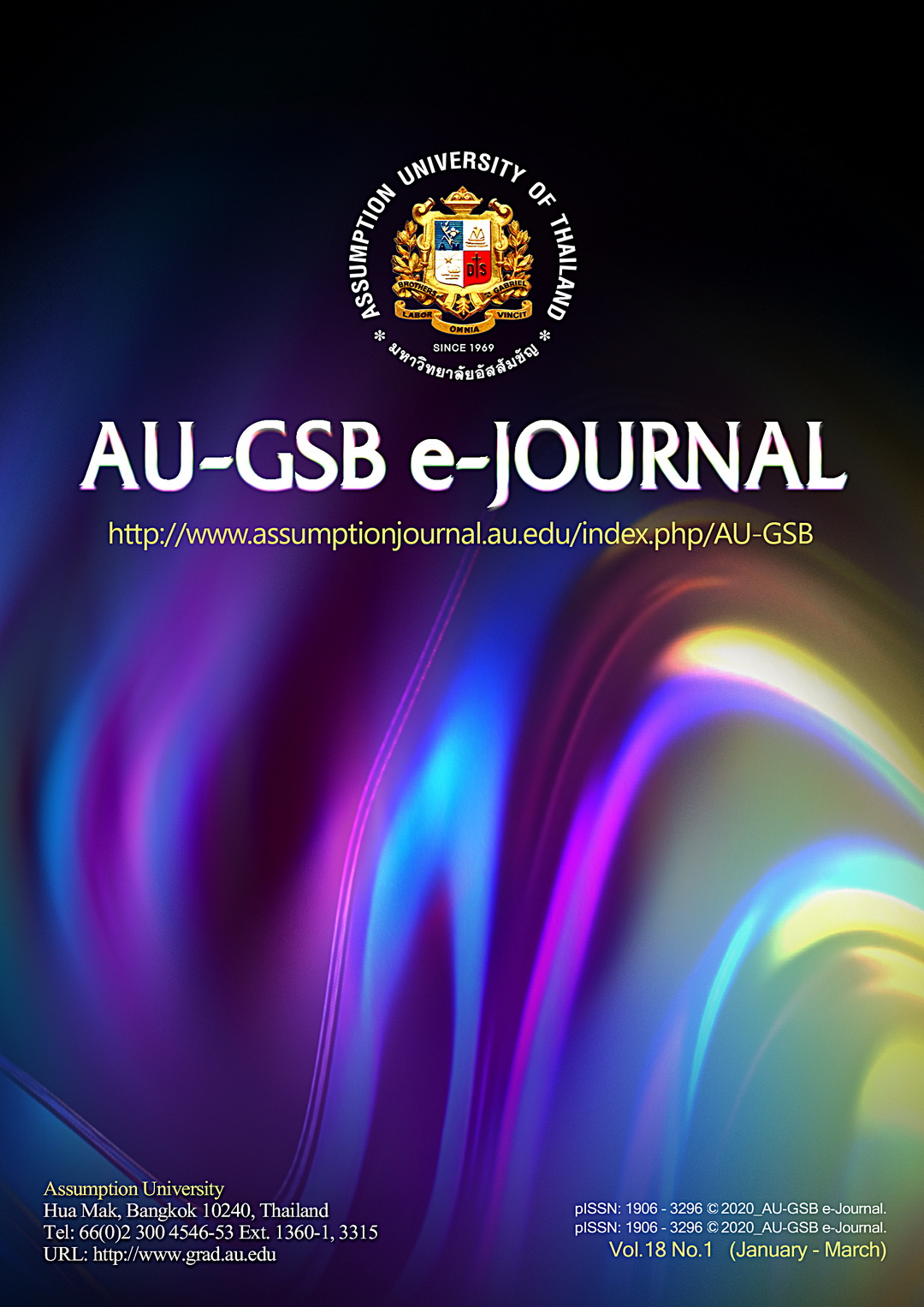Relationship between Facilitative Focus Moderation and Psychological Capital on Change Support Behavior: Taking Organizational Support Climate as Moderating Variable
Main Article Content
Abstract
Purpose: This study investigates how employees' focus adjustment and psychological capital influence their support for organizational change in Internet companies. It also examines the moderating effect of organizational support climate on these relationships. Research design, data and methodology: A survey was administered to 246 employees working in Internet companies. Data were analyzed using multiple linear regression to identify the relationships among focus adjustment, psychological capital, organizational support climate, and change support behaviors. Results: The results show that promotional focus adjustment positively affects employees’ change support behaviors. Facilitative focus regulation enhances psychological capital, which in turn positively influences change support behaviors. Psychological capital also mediates the relationship between facilitative focus regulation and change support behaviors. Moreover, organizational support climate moderates the effect of psychological capital on change support, enhancing the likelihood of positive change behaviors. Conclusions: The findings highlight the importance of both psychological capital and organizational support climate in encouraging change support behaviors. Leaders should tailor strategies to stimulate employees' facilitative focus adjustment and ensure sufficient resources to enhance psychological capital, especially in supportive organizational climates, to foster effective change management.
Downloads
Article Details

This work is licensed under a Creative Commons Attribution 4.0 International License.
The submitting author warrants that the submission is original and that she/he is the author of the submission together with the named co-authors; to the extend the submission incorporates text passages, figures, data, or other material from the work of others, the submitting author has obtained any necessary permission.
Articles in this journal are published under the Creative Commons Attribution License (CC-BY What does this mean?). This is to get more legal certainty about what readers can do with published articles, and thus a wider dissemination and archiving, which in turn makes publishing with this journal more valuable for you, the authors.
References
Avey, J. B., Reichard, R. J., Luthans, F., & Mhatre, K. H. (2011). Meta-analysis of the impact of positive psychological capital on employee attitudes, behaviors, and performance. Human Resource Development Quarterly, 22(2), 127-152. https://doi.org/10.1002/hrdq.20070
Bailey, J. O., Bailenson, J. N., & Casasanto, D. (2016). When does virtual embodiment change our minds?. Presence, 25(3), 222-233. https://doi.org/10.1162/PRES_a_00263
Bandura, A. (1982). Self-efficacy mechanism in human agency. Psychologist, 3(7), 122-147. https://doi.org/10.1037/0003-066X.37.2.122
Drzensky, F., Egold, N., & van Dick, R. (2012). Ready for a change?: A longitudinal study of antecedents, consequences and contingencies of readiness for change. Journal of Change Management, 12(1), 95-111. https://doi.org/10.1080/14697017.2011.652377
Faupel, S., & Süß, S. (2019). The effect of transformational leadership on employees during organizational change-an empirical analysis. Journal of Change Management, 19(3), 145-166. https://doi.org/10.1080/14697017.2018.1447006
George, J. M., & Brief, A. P. (1992). Feeling good-doing good: A conceptual analysis of the mood at work-organizational spontaneity relationship. Psychological Bulletin, 112(2), 310-329. http://ereserve.library.utah.edu/Annual/MGT/7800/Brief/george-2.pdf
George, J. M., & Jones, G. R. (2001). Towards a process model of individual change in organizations. Human Relations, 54(4), 419-444. https://doi.org/10.1177/0018726701544002
Gonzalez-Roma, V., Fortes-Ferreira, L., & Peiro, J. M. (2019). Team climateclimate strength and team performance: A longitudinal study. Journal of Occupational and Organizational Psychology, 8(2), 511-536. https://doi.org/10.1348/096317908X370025
Hassan, H. A., Zhang, X., Ahmad, A. B., & Liu, B. (2021). Public service motivation and employee change-supportive intention: Utilizing the theory of planned behavior. Public Personnel Management, 50(2), 283-304. https://doi.org/10.1177/0091026020934515
Higgins, E. T. (1998). Promotion and prevention: Regulatory focus as a motivational principle. Advances in Experimental Social Psychology, 3(2), 1-46. https://doi.org/10.1016/S0065-2601(08)60381-0
Higgins, E. T., Friedman, R. S., Harlow, R. E., Idson, L. C., Ayduk, O. N., & Taylor, A. (2001). Achievement orientations from subjective histories of success: Promotion pride versus prevention pride. European Journal of Social Psychology, 31(2), 3-23. https://doi.org/10.1002/ejsp.27
Hobfoll, S. E. (1989). Conservation of resources: A new attempt at conceptualizing stress. American Psychologist, 44(3), 513-524. https://www.researchgate.net/profile/Stevan-Hobfoll-2/publication/20507127_Conservation_of_Resources_A_New_Attempt_at_Conceptualizing_Stress/links/53ed1c190cf2981ada12af0c/Conservation-of-Resources-A-New-Attempt-at-Conceptualizing-Stress.pdf
Kim, T. G., Hornung, S., & Rousseau, D. M. (2011). Change-supportive employee behavior: Antecedents and the moderating role of time. Journal of Management, 37(6), 1664-1693. https://doi.org/10.1177/0149206310364243
Kusi, M., Zhao, F., & Sukamani, D. (2021). Impact of perceived organizational support and green transformational leadership on sustainable organizational performance: A SEM approach. Business Process Management Journal, 27(5), 1373-1390. https://doi.org/10.1108/BPMJ-09-2020-0419
Lee, C. H., & Chu, K. K. (2016). Understanding the effect of positive psychological capital on hospitality interns’ creativity for role performance. International Journal of Organizational Innovation, 8(4), 213-230.
Luthans, F., Avolio, B. J., & Youssef, C. M. (2006). Psychological Capital: Developing the Human Competitive Edge. Oxford University Press.
Tüzün, İ. K., Çetin, F., & Basim, H. N. (2014). The role of psychological capital and supportive organizational practices in the turnover process. METU Studies in Development, 4(1), 85-103. https://hdl.handle.net/11511/58308
Vakola, M., Petrou, P., & Katsaros, K. (2021). Work engagement and job crafting as conditions of ambivalent employees’ adaptation to organizational change. The Journal of Applied Behavioral Science, 57(1), 57-79. https://doi.org/10.1177/0021886320967173
Zhao, X., & Namasivayam, K. (2012). The relationship of chronic regulatory focus to work-family conflict and job satisfaction. International Journal of Hospitality Management, 31(2), 458-467. https://doi.org/10.1016/j.ijhm.2011.07.004
